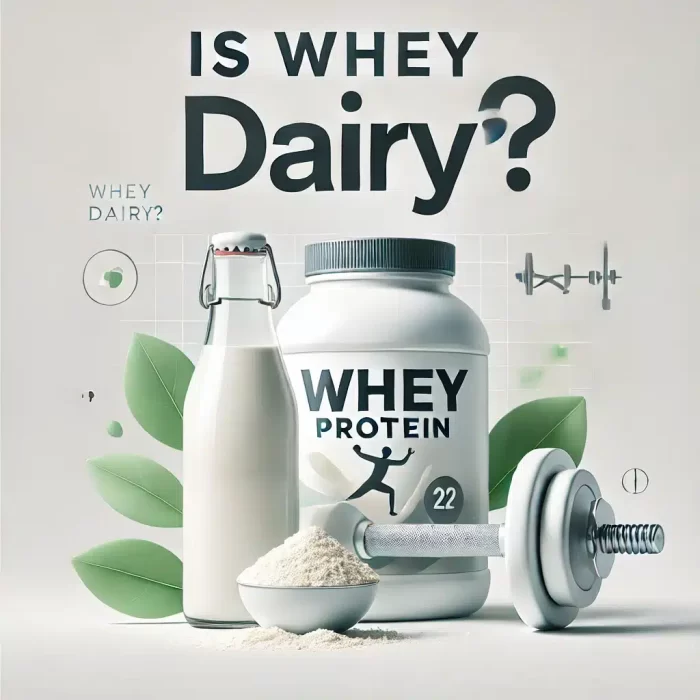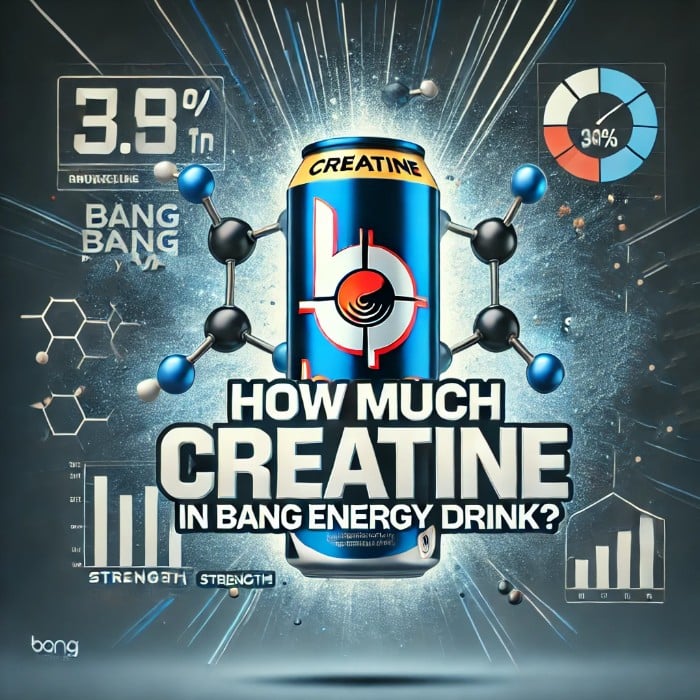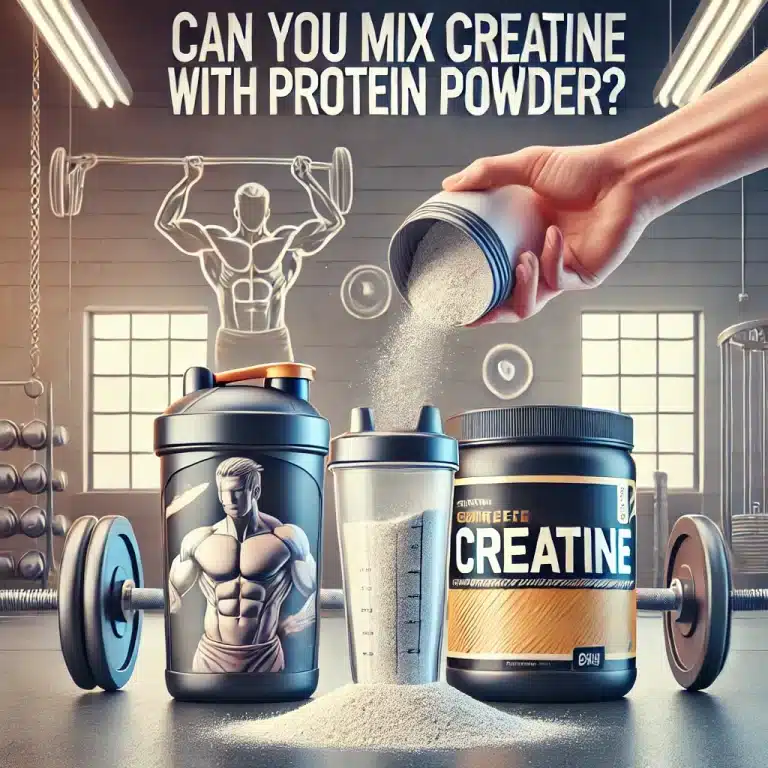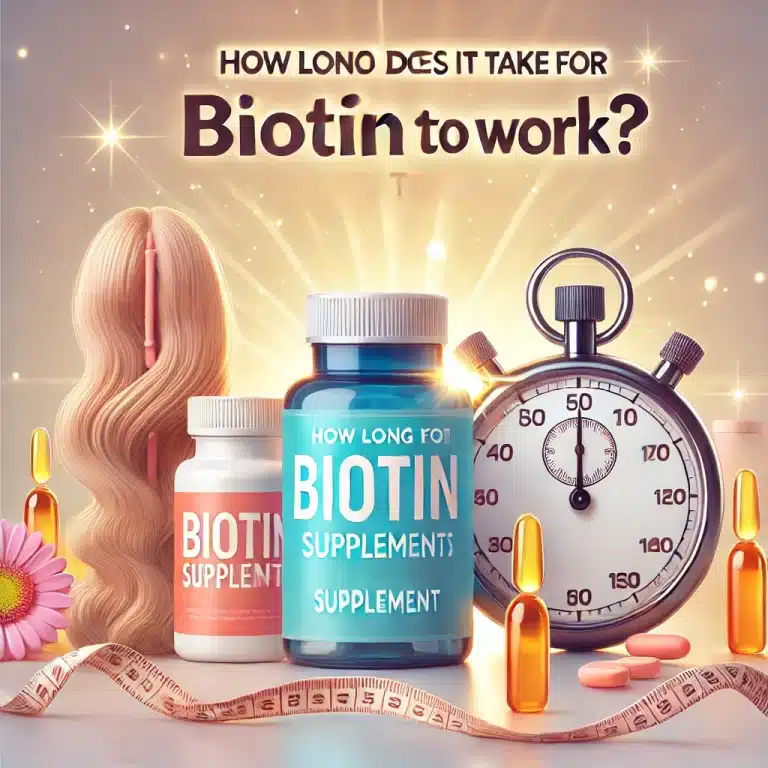Is Whey Dairy? The Truth Behind This Popular Protein
If you have ever picked up a tub of whey protein, you may have asked yourself— is whey dairy? It has a common question with lactose intolerance, dairy allergies, or also not in a dairy-free diet. With so many different protein powders available to buy, knowing what you’re putting in your body is essential.
Whey protein is one of the most popular supplements we use in the fitness and nutrition space. Athletes and bodybuilders, as well as those simply wishing to nurture their health, use it to repair muscle tissue, gain strength, and even lose weight. But if you’re trying to avoid dairy, does that mean whey protein is out? And if you need a dairy-free option, what are the best substitutes?
In this article, we’ll explore what whey protein is, if it has lactose, and if it’s safe for those avoiding dairy. And we’ll break down the best dairy-based protein options if you’re looking to fuel your body without all the potential downsides of milk.
does whey protein have lactose?
Whey protein has lactose because it comes from milk, but the amount of lactose in the product varies based on the type of whey protein product you get. Lactose, the sugar present in milk, can cause bloating, gas, and diarrhea in lactose-intolerant persons. But as a nutritionist, I know the lactose content isn’t the same in all whey products. Knowing the distinctions can help you choose wisely.
- Whey Protein Concentrate: This type of whey protein is usually the least processed and it is about 70-80% protein by weight making up the remaining fats, carbohydrates, and lactose. Ideal for people with lactose intolerance (who believe that the lactose content can still be high). Although rich and usually cheaper, it is best for people who do well with dairy.
- Whey Protein Isolate: Whey protein isolate is processed further to remove most of the fat and lactose, with a product that is at least 90% protein by weight. Because it has a very low lactose content, whey isolate is a good alternative for people with mild lactose intolerance. It is a high-biological value protein, which is rapidly absorbed by the body without the adverse effects of lactose.
- Hydrolyzed Whey Protein: This form of whey protein is predigested to improve absorption through hydrolysis. For this reason, although it typically has even less lactose than isolate, the degree of hydrolysis differs from brand to brand. Hydrolyzed whey is a great option for those with sensitive digestion, as it’s less likely to cause gastrointestinal distress, says my go-to nutritionist. But it may be pricier and may have a bitter taste from the hydrolysis process.
- Hidden Lactose Coming from Whey Products: The ingredient list of any whey protein powder you buy should ideally be as short as possible. (Other products may use added milk products, like milk solids or casein, which raises the lactose content.) If you are particularly sensitive to lactose, always check with the label.
From a nutritionist’s perspective, lactose in whey protein is not malicious but has to be taken care of based on individual tolerance levels. If you are unsure about how lactose tolerant you are, I often suggest you start with a small serving of whey isolate to see how your body responds. Digestive enzymes that contain lactase, an enzyme that digests lactose, may also be helpful.
Some good substitutes are pea, rice, or hemp protein for people with extreme lactose intolerance or dairy allergy. They offer protein in isolation without lactose, so everyone can achieve their dietary and passion goals without hurdles.
Recognizing what gluten content is in each product can help you select the best for your health and lifestyle choices.
Is Whey Suitable for Lactose Intolerant Individuals?
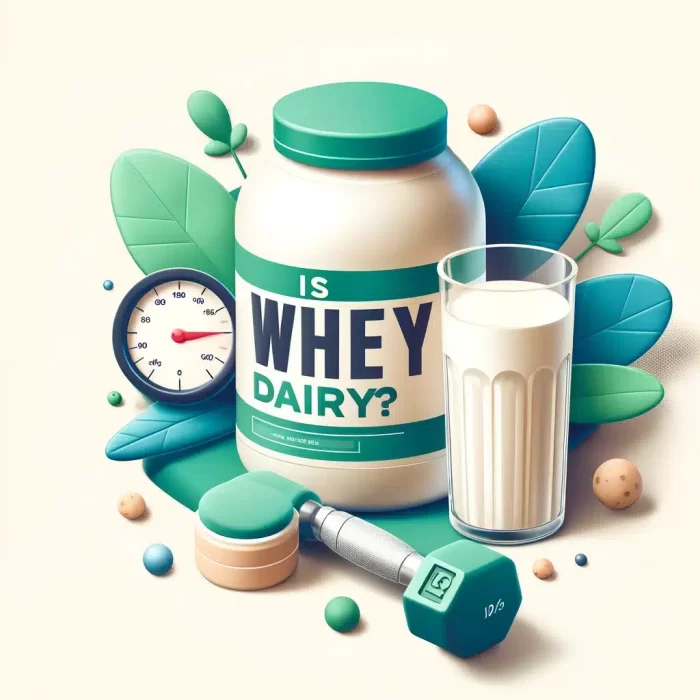
Whether or not whey protein is suitable for people with lactose intolerance will generally depend on the type of Whey protein consumed and the severity of the intolerance itself. I have come across clients through my sessions as a nutritionist who is unsure about the feasibility of including whey in their diets. Here’s a closer look at how various forms of whey protein might affect people with lactose intolerance:
Whey Protein & Lactose Intolerance: How to Enjoy It Anyway!
For those who are lactose intolerant, whey protein can be somewhat of a gamble. One serving might be perfectly fine, another might send you sprinting for the bathroom. But here’s the bright side: Depending on the type of whey and how much you can tolerate, you might not need to cut it out altogether.
Mild Lactose Malabsorption: How Good Are You at Whey?
If you have mild lactose intolerance, a whey protein isolate may work for you. Whey isolate differs from whey protein concentrate in that it has been processed to withdraw most of the lactose, typically leaving less than 1 gram in a serving. That means less drama in the gut, less bloating, and a much easier time digesting.
Still worried? You can always pair it with a lactase enzyme supplement. This small enzyme helps digest lactose before it has a chance to cause any problems—essentially acting as a bodyguard for your gut.
Moderate to Severe Intolerance: Proceed with Caution
Now if you’re the type who gets set off big time, even a miniscule amount of lactose, then yes, whey protein isolate could still be an issue. Others are even more intensely intolerant and react to tiny smidgeons of gluten, so discomfort is still possible.
That said, this time around it might be worth considering hydrolyzed whey protein instead. Since it’s pre-digested (as weird as that sounds, just trust the process), it is nicer on the stomach and reduces the opportunity for irritation. That said, everybody’s different — so if even that doesn’t do it for you, it may be time for you to try some nondairy stuff.
Significant Difference Between Lactose Intolerance and Dairy Allergy
Let’s get one thing straight that often gets confused: lactose intolerance is NOT a dairy allergy.
- Lactose intolerant = your body has no idea how to break down lactose, which leads to bloating, discomfort, and digestive issues.
- Dairy allergy = your immune system sees dairy as an invader, and can result in hives, swelling, or even life-threatening allergies.
In people who truly have an allergy to dairy, all forms of whey protein are out of the question. Doesn’t matter if it’s isolated or hydrolyzed or whatever — just not safe.”
How to Incorporate Whey Protein Into Your Diet
So you’re ready to try whey? Here’s how to dip a toe without sending your system into shock:
- Start Small: Work up to half a scoop and assess how you react. If your gut isn’t grumbling, gradually ramp up.
- Choosing Wisely: Opt for whey isolate or those specifically labeled low lactose.
- Use a Lactase Supplement: If you love whey but whose one, pop a lactase enzyme before. It might be the fix you need.
Whey Protein Alternatives (When Dairy Just Isn’t It)
If whey doesn’t sit well no matter what, don’t sweat it — there are a ton of great alternatives!
- Plant-based protein powders (pea, rice, or soy protein)
- Blended plant proteins provide you with a complete amino acid profile, so they are a great replacement for whey.
- Egg white protein is a second option that is still animal-based but entirely dairy-free.
Ultimately, everyone’s body reacts differently. Some can tolerate a bit of whey, others should avoid it altogether. The trick is being able to listen to your body, make careful experiments with the kinds of foods that you eat, and pick the parts of it that make you feel best.
In my professional opinion, whey protein can be a great tool for muscle recovery and general good health, but it’s not a magical solution that works for all. If you are lactose intolerant, knowing your body’s reaction and alternatives when necessary can help you meet your protein needs without discomfort.
Whey Protein Alternatives for Vegans and the Lactose Intolerant
For those who are unable to take whey protein due to lactose intolerance, dairy allergies, or a vegan lifestyle, there are high-quality supplements made from different types of plant-based protein available. As a nutritionist, here are my top suggestions for nutritious choices that you can do so much with:
Pea Protein Supplements:
Why Choose Pea Protein? Pea protein is rich in essential amino acids, especially lysine, which helps with muscle recovery and immune function. It’s hypoallergenic and thus appropriate for people with sensitivities.
Top Products to Consider: Sometimes, all you need is good old-fashioned pea protein. Look for options from trusted brands such as “Orgain Organic Protein or “Naked Pea,” which primarily (or entirely) consists of pure pea protein with no additives.
Rice Protein Supplements:
Why Choose Rice Protein? A protein that you make from brown rice is rich in methionine and cysteine but poor in lysine. It’s a complete amino acid profile when paired with pea protein.
It is a Registered Dietitian who eats and lives a healthy and active lifestyle!
Hemp Protein Supplements:
Why Choose Hemp Protein? Rich in omega-3 and omega-6 fatty acids, hemp protein also provides nutritional perks, such as fiber and key minerals, such as magnesium and iron.
Best products: “Nutiva Organic Hemp Protein”, etc.
Soy Protein Supplements:
Why Choose Soy Protein? Soy is a complete protein, meaning it contains all nine essential amino acids. It’s perfect for anyone who wants a plant protein whose nutrient quality rivals that of whey.
Best Products To Try — “NOW Sports Soy Protein Isolate ” & “Bob’s Red Mill Soy Protein Powder”.
Blended Plant-Based Proteins:
Why Choose Blended Proteins? Mixing sources (like peas, rice, and hemp) ensures a complete amino acid profile. These blends simulate the nutritional profile of whey, but they are dairy-free.
Notable Products to Keep in Mind: “Vega One All-in-One Shake” and “Garden of Life Raw Organic Protein” best suit varied nutritional requirements.
Pumpkin Seed Protein Supplements:
Why Pumpkin Seed Protein? Rich in magnesium, zinc, and antioxidants, this protein promotes overall health while also providing a solid serving of plant-based protein.
Price Considerations: $7-$10Top Products to Consider: Sprout Living Pumpkin Seed Protein
Also, for those who have a problem with gluten, check is whey gluten-free or not!
Benefits of Whey Protein for Those Who Tolerate Dairy
Whey protein offers many benefits for individuals who can tolerate dairy, making it one of the most effective and widely used protein supplements available. Here are some key advantages:
- Amino Acid Profile: One of the reasons whey protein is classified as a high biological value (BV) protein is its highly bioavailable state, meaning it is easily taken up and utilized in maximizing function in the body. A prime candidate for muscle recovery — and muscle growth.
- High in branched-chain amino acids: Whey is particularly high in the branched-chain amino acids, leucine, isoleucine, and valine. They’re important for muscle repair, which helps limit injury and soreness after exercise, and for stimulating muscle protein synthesis. The amino acid of greatest importance in terms of stimulating muscle is leucine.
- Fast Absorption: Whey protein is rapidly digested and absorbed in the body, so it is perfect for taking super-charge lines right after a workout when the muscles are ready to absorb nutrients. As such, it is quick to absorb into the body—amino acids reach muscle in time to repair and recover.
- Support for Your Immune System: Proteins such as immunoglobulins and lactoferrin can be found in whey protein, all of which aid in the immune system. For people with high-flying fitness
Who Should Avoid Whey Protein?
Although whey protein has many health and fitness benefits, it is not ideal for everyone. For others, dietary restrictions, health conditions, or personal values mean it is a less-than-ideal choice. Here’s a closer look at why some people may steer clear of whey protein:
Dairy Allergy or Lactose Intolerance
Moreover, people with lactose intolerance will give rise to digestive symptoms such as bloating, gas, diarrhea, and stomach cramps due to the consumption of whey protein. Whey isolates with low amounts of lactose can still cause reactions in individuals with extreme sensitivity. Whey products are processed, but lactose — the natural sugar found in milk — lingers in trace amounts. If you are lactose intolerant, consider moving to plant proteins (pea, rice, or hemp protein) to replace your whey protein. They DO NOT contain dairy and DSL will give you high-quality protein while also not hurting your stomach on your fitness journey.
For people with a dairy allergy, the situation is more serious. Dairy allergies are an immune response against milk proteins, including whey and casein. Symptoms can include skin irritation digestive distress, and in some cases, life-threatening anaphylaxis. If you’re allergic to dairy, avoid anything with whey, completely — you’ll want to choose allergy-friendly, dairy-free protein sources only, such as soy or pumpkin seed protein.
Vegan Lifestyle
As a dairy byproduct, whey protein is unsuitable for a vegan lifestyle, whereas vegetarians can have whey protein.
Vegans refrain from consuming ALL animal products, including whey, for ethical, environmental, and health reasons. Fortunately, many vegan protein powders are available to fulfill your nutritional needs. Pea protein, soy protein, and hemp protein, or blends of plant proteins provide a complete amino acid profile and are just as effective as whey. Plus, most plant-based protein powders are fortified with vitamins and minerals so you are not missing out on essential vitamins and minerals you commonly may get only from meat or animal-derived products and eggs, etc.
Ethical or Environmental Issues
Whey protein production is linked to the dairy industry, which has raised ethics and sustainability questions. For others, the ethical concerns around dairy farming — and the treatment of the cows involved — render whey an unappetizing option. Moreover, dairy production has a considerable environmental footprint, releasing greenhouse gases, causing deforestation, and consuming water. If eco-friendly, switching to plant-based proteins (such as hemp protein, and rice protein) is an ecologically friendly solution. These healthy solutions were carefully chosen on an eco-friendly basis, while still supplying the necessary nourishment for a busy lifestyle.
Choosing the Right Protein for Your Lifestyle
Here are the best protein supplements: When choosing a protein supplement, it’s important to keep your dietary needs, goals, and any potential sensitivities in mind. If you digest dairy well, whey protein is a great option since it contains a better amino acid pool and absorption rate. But for those who want egg alternatives, there are plant-based options such as peas, rice, or soy protein that do the job very well.
Frequently Asked Questions About Whey and Dairy
Is whey protein a good option for weight loss?
Whey protein can support weight loss by promoting satiety and preserving muscle mass during calorie deficits.
Can I mix whey protein with milk or water?
Both options work! Mixing with milk adds extra protein and a creamier texture, while water keeps it lighter and lower in calories.
Are there flavored plant-based proteins?
Absolutely. Many brands offer plant-based proteins in chocolate, vanilla, and other flavors to match the taste profile of whey protein powders.
Conclusion:
So, is whey dairy?
The answer is yes. Because it is a dairy product made from milk, whey protein is not appropriate for vegans or people with extreme lactose intolerance. But, with breakthroughs in nutrition and tons of plant-based options available, there is a protein supplement for everyone on the quest for their diet and fitness goals.
It’s crucial to stay healthy, so whether you’re opting for whey protein or one of the non-dairy alternatives, picking a protein powder that matches your body’s needs and lifestyle is essential. As it should be, your journey toward optimal health and performance should always be individualized and customized to what works best for you.
